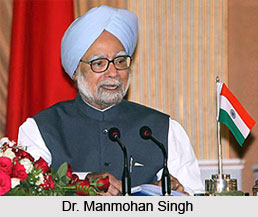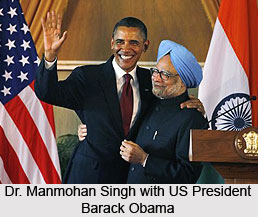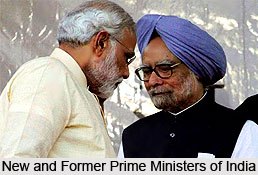 Dr. Manmohan Singh was the 13th and 14th Prime Minister of India. Singh is a member of the Indian National Congress party. He was the first Sikh to become Prime Minister of India on May 22, 2004.
Dr. Manmohan Singh was the 13th and 14th Prime Minister of India. Singh is a member of the Indian National Congress party. He was the first Sikh to become Prime Minister of India on May 22, 2004.
Dr. Manmohan Singh is one of the most qualified and influential figures in India`s recent history, because of the economic liberalisation that he started in 1991 when he was Finance Minister of India during the Prime Ministership of Pamulaparti Venkata Narasimha Rao, famous as P.V. Narasimha Rao. Dr. Manmohan Singh is an economist by profession, and has formerly served in the International Monetary Fund. Singh is also known to be an unassuming politician, enjoying a formidable, highly respected and admired image. After Jawaharlal Nehru, he was the only Prime Minister who returned to power after the completion of a full five-year term.
The results of Indian General Election for 16th Lok Sabha, declared on 16th May, 2014 created the huge defeat of Indian National Congress. Following a huge loss in Indian general election of Congress, Dr. Manmohan Singh resigned from the post of Prime Minister of India on 17 May, 2014.
Due to his work at the United Nations, International Monetary Fund and other international bodies, he is very highly respected around the world. He was awarded the Outstanding Parliamentarian Award in 2002.
Before becoming Prime Minister of India, he served as the Finance Minister under Prime Minister P.V. Narasimha Rao. He is widely credited for transforming the economy in the early 90s, during the financial crisis of India.
He also served as leader of the opposition, in the Upper House, from 1998 - 2004 when the Bharatiya Janata Party (BJP) led coalition government was in office. In 2010, a reputed magazine recognized him as a world leader who is respected by other heads of state, describing him as `the leader other leaders love.`
Early Life of Dr. Manmohan Singh
Dr. Manmohan Singh was born on 26 September 1932, in Gah, Punjab (now in Pakistan) into a Kohli family. Now it is a District City named Chakwal. Their family moved to Amritsar after the Partition of India. After losing his mother at a young age, he was brought up by his paternal grandmother. He attended Hindu College in Amritsar followed by Punjab University, Chandigarh. Later he studied economics in Hoshiarpur, Punjab, and earned his Master`s degree in 1954. He was an outstanding student throughout his academic life. He completed his studies in Economics Tripos at University of Cambridge. He also attended the University of Oxford for the D.Phil in 1960.
Dr. Manmohan Singh as an Economist
Dr. Singh is widely regarded as the architect of India`s original economic reform programme which was enacted in 1991 under P. V. Narasimha Rao`s administration. The economic liberalization package pushed by Dr. Manmohan Singh and P. V Narasimha Rao opened the nation to foreign direct investment and reduced the red tape that had previously impeded business growth. The liberalization was prompted by an acute balance-of-payments crisis whereby the Indian Government was left without sufficient reserves to meet its obligations, and had begun preparations to mortgage its gold reserves to the Bank of England in order to obtain the cash reserves needed to run the country. Singh served as the governor of the Reserve Bank of India in the late 1980s, and was elevated to finance minister in 1991 by Prime Minister Narasimha Rao.
 Many see the 1991 liberalization as the first of a series of economic liberalizations throughout the 1990s and 2000s that have raised India`s growth rates substantially since the early 1990s. Despite its economic liberalization policies, Rao`s government was defeated in the next election. His economic policies, which included the gradual doing away of several socialist policies, were popular, especially among the middle class. He enjoys strong support among the middle and educated classes of India due to his educational background. Manmohan Singh lost his seat in the Lok Sabha from South Delhi in 1999. He is thus the only Indian Prime Minister never to have been an elected member of the Lower House of Parliament. He has been a member of the Rajya Sabha for Assam since 1991. He is a native Punjabi language speaker.
Many see the 1991 liberalization as the first of a series of economic liberalizations throughout the 1990s and 2000s that have raised India`s growth rates substantially since the early 1990s. Despite its economic liberalization policies, Rao`s government was defeated in the next election. His economic policies, which included the gradual doing away of several socialist policies, were popular, especially among the middle class. He enjoys strong support among the middle and educated classes of India due to his educational background. Manmohan Singh lost his seat in the Lok Sabha from South Delhi in 1999. He is thus the only Indian Prime Minister never to have been an elected member of the Lower House of Parliament. He has been a member of the Rajya Sabha for Assam since 1991. He is a native Punjabi language speaker.
Dr. Singh stayed with the Congress Party despite continuous marginalization and defeats in the elections of 1996, 1998 and 1999. He did not join the rebels in a major split which occurred in 1999, when three Congress leaders objected to Sonia Gandhi`s rise as Congress President and Leader of the Opposition.
The Congress alliance won a surprisingly high number of seats in the Parliamentary elections of 2004. The Left Front decided to support a Congress alliance government from outside. Sonia Gandhi was elected leader of the Congress Parliamentary Party and was expected to become the Prime Minister. In an unexpected move, she declined to accept the post and instead nominated Manmohan Singh. Singh secured the nomination for prime minister on May 19, 2004 when President A.P.J. Abdul Kalam officially asked him to form a government. Although most expected him to head the Ministry of Finance himself, he entrusted the job to P. Chidambaram.
Dr. Manmohan Singh as the Prime Minister of India
The image of Dr. Manmohan Singh is a formidable intellectual, a political leader of integrity (a prevalent public perception denounces most national bureaucracies as corrupt and tainted), someone who is compassionate and attentive to common people, and as a recognised technocrat. Although legislative achievements have been few and the Congress-led alliance is routinely hampered by conflicts, Singh`s administration has focused on reducing the fiscal deficit, providing debt-relief to poor farmers, extending social programs and advancing the pro-industry economic and tax policies that have launched the country on a major economic expansion course since 2002. Singh has been the image of the Congress campaign to defuse religious tensions and conflicts and bolster political support from minorities like Muslims and Christians.
Foreign Policy of Dr. Manmohan Singh
The Prime Minister`s foreign policy has been to continue the new peace process with Pakistan initiated by his predecessor, Atal Bihari Vajpayee. Exchange visits by top leaders from both countries have highlighted this year, as has reduced terrorism and increased prosperity in the state of Jammu and Kashmir. The peace process has also been used by the government to build stronger relations with the United States, China and European nations.
Leadership of Dr. Manmohan Singh
Dr. Singh is known as a bold leader. He made it clear in his address to Parliament in 2006 regarding his Nuclear Deal with US. He said he believed in taking India to new heights. Energy scarcity is hampering progress of the country. The speech gave signal of a new Manmohan Singh, who compelled his fellow parliamentarians to take a step forward for India`s sake. He reminded them of the fears and anxieties that existed when he announced reforms in the early 1990s. He resigned as the Prime Minster of India along with declaring his retirement on 17th May 2014 following a major defeat of Congress party in 2014 general election. He was an acting Prime Minister of India till 25th May, 2014.
Personal Life of Dr. Manmohan Singh
Dr. Manmohan Singh married to Mrs. Gursharan Kaur since September 14, 1958. They have three daughters namely Upinder Singh, Daman Singh and Amrit Singh. Dr. Manmohan Singh has undergone multiple cardiac bypass surgeries.
 Degrees and Posts held by Dr. Manmohan Singh
Degrees and Posts held by Dr. Manmohan Singh
•BA (Honours) in Economics 1952; MA First Class in Economics, 1954 Punjab
•University, Chandigarh (Was then in Hoshiarpur, Punjab), India
•Honours Degree in Economics, University of Cambridge - (St John`s College; 1957) Senior Lecturer, Economics (1957-1959)
- Reader (1959-1963)
- Professor (1963-1965)
- Professor of International Trade (1969-1971)
•DPhil in Economics, University of Oxford - (Nuffield College; 1962)
•Delhi School of Economics, University of Delhi
- Honorary Professor (1966)
•Chief, Financing for Trade Section, UNCTAD, United Nations Secretariat, Manhattan, New York
•1966 : Economic Affairs Officer 1966
•Economic Advisor, Ministry of Foreign Trade, India (1971-1972)
•Chief Economic Advisor, Ministry of Finance, India, (1972-1976)
•Honorary Professor, Jawaharlal Nehru University, New Delhi (1976)
•Director, Reserve Bank of India (1976-1980)
•Director, Industrial Development Bank of India (1976-1980)
•Secretary, Ministry of Finance (Department of Economic Affairs), Government of India, (1977-1980)
•Governor, Reserve Bank of India (1982-1985)
•Deputy Chairman, Planning Commission of India, (1985-1987)
•Secretary General, South Commission, Geneva (1987-1990)
•Advisor to Prime Minister of India on Economic Affairs (1990-1991)
•Chairman, University Grants Commission (15 March 1991 - 20 June 1991)
•Finance Minister of India, (21 June 1991 - 15 May 1996)
•Leader of the Opposition in the Rajya Sabha (1998-2004)
•Prime Minister of India (22 May 2004 - 17 May 2014)
Awards and Honours of Dr. Manmohan Singh
| Year | Name of Award or Honour | Awarding Organisation |
| 2010 | World Statesman Award | Appeal of Conscience Foundation |
| 2005 | Top 100 Influential People in the World | Time |
| 2002 | Outstanding Parliamentarian Award | Indian Parliamentary Group |
| 2000 | Annasaheb Chirmule Award | Annasaheb Chirmule Trust |
| 1999 | H.H. Kanchi Sri Paramacharya Award for Excellence | Shri R. Venkataraman, The Centenarian Trust |
| 1999 | Fellow of the National Academy of Agricultural Sciences, New Delhi | National Academy of Agricultural Sciences |
| 1997 | Lokmanya Tilak Award | Tilak Smarak Trust, Pune |
| 1997 | Justice K.S. Hegde Foundation Award | Justice K.S. Hegde Foundation |
| 1997 | Nikkei Asia prize for Regional Growth | Nihon Keizai Shimbun Inc. |
| 1996 | Honorary Professorship | Delhi School of Economics, University of Delhi, Delhi |
| 1995 | Jawaharlal Nehru Birth Centenary Award (1994-95) | Indian Science Congress Association |
| 1994 | Finance Minister of the Year | Asiamoney |
| 1994 | Jawaharlal Nehru Birth Centenary Award (1994-5) | Indian Science Congress Association |
| 1994 | Elected Distinguished Fellow of the London School of Economics | London School of Economics, Centre for Asia Economy, Politics and Society |
| 1994 | Elected Honorary Fellow, Nuffield College | Nuffield College, University of Oxford, Oxford, U.K. |
| 1994 | Elected Distinguished Fellow of the London School of Economics | London School of Economics, Centre for Asia Economy, Politics and Society |
| 1994 | Elected Honorary Fellow of the All India Management Association | All India Management Association |
| 1993 | Finance Minister of the Year | Euromoney |
| 1993 | Finance Minister of the Year | Asiamoney |
| 1987 | Padma Vibhushan | President of India |
| 1986 | Elected National Fellow, National Institute of Education | National Institute of Education |
| 1985 | Elected President of the Indian Economic Association | Indian Economic Association |
| 1982 | Elected Honorary Fellow, St. John"s College | St. John"s College, Cambridge |
| 1982 | Elected Honorary Fellow, Indian Institute of Bankers | Indian Institute of Bankers |
| 1976 | Honorary Professorship | Jawaharlal Nehru University, New Delhi |
| 1957 | Elected Wrenbury Scholar | University of Cambridge, U.K. |
| 1956 | Adam Smith Prize | University of Cambridge, U.K. |
| 1955 | Wright Prize for Distinguished Performance | St. John"s College, Cambridge, U.K. |
| 1954 | Uttar Chand Kapur Medal, for standing first in M.A. (Economics) | Punjab University, Chandigarh (Was then in Hoshiarpur, Punjab) |
| 1952 | University Medal for standing first in B.A. (Honours Economics) | Punjab University, Chandigarh |






